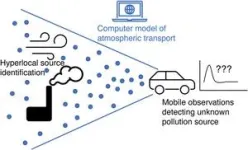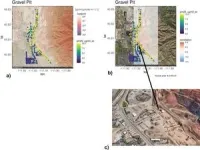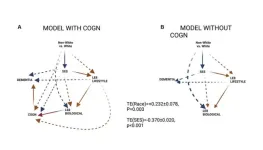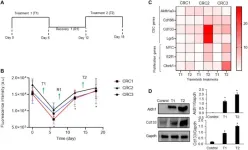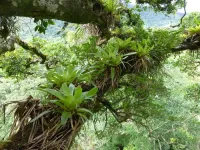(Press-News.org) With a population of 127 million and a land mass about a fifth the size of the United States, Mexico has a large spectrum of climates and landscapes, ranging from mountains to coastal regions and from deserts to glaciers. Because of these variations, it is important for communities to understand precipitation patterns to plan appropriately for weather events and water resources management.
A team led by Ricardo Sánchez-Murillo, associate professor of earth and environmental sciences at The University of Texas at Arlington, has created a new isotope database that includes 608 monthly rain samples (spanning 2018-22) from 21 monitoring stations across the country. The results of his work are published open access in the journal PLOS Water. Co-authors are from the Mexican Institute of Water Technology in Mexico City; the International Atomic Energy Agency in Vienna, Austria; and the Universidad de Vigo in Ourense, Spain.
For decades, most studies have relied on data archives from two stations in the Global Network of Isotopes in Precipitation that operated in Mexico from 1962-88. One station was in the city of Chihuahua (northern arid region); a second was in the city of Veracruz (southeastern wet region). This represents a relatively low number of monitoring stations for such a large and heterogeneous country, with abundant rain in the south and scarce precipitation in the north. Mexico has rain forests, vast deserts, tropical and mid-latitude climates, an enormous plateau bounded by two mountain ranges where ice caps are still present, and coastlines facing the Pacific Ocean, Gulf of Mexico, Gulf of California and Caribbean Sea, Sánchez-Murillo said.
Similarly, Mexico is affected by multiple climatic features, such as the influence of cold fronts, atmospheric rivers, easterly waves, tropical cyclones and northerly trade winds. All these topographic, geographic and weather characteristics are represented in a large spectrum of climatic regions across Mexico, he said.
The authors report on the spatial and temporal isotope variations of 21 precipitation monitoring stations across different physiographic units of Mexico. These stations are part of the National Network of Isotopes in Precipitation operated by the Department of Hydrology of the Mexican Institute of Water Technology.
“Our results fill a recognized historical gap in the precipitation isotope monitoring in North America” Sánchez-Murillo said. “This will provide a baseline for other researchers to pursue more detailed ecohydrological, climatic, forensic, archeological and paleoclimate studies across Mexico.”
END
Isotope database will help Mexican communities better understand hydrology processes
Project provides baseline for hydrological, ecological, archeological and paleoclimate studies
2023-10-11
ELSE PRESS RELEASES FROM THIS DATE:
Novel drug, NFX-179, inhibits MEK activity, prevents cutaneous squamous cell carcinoma development
2023-10-11
TAMPA, Fla. — Cutaneous squamous cell carcinoma is the second most common type of skin cancer in the United States, impacting approximately 700,000 people each year. While medications exist to prevent the development of disease, they are associated with side effects, suggesting the need for new drugs that can be safely used to prevent it. In a new article published today in Science Translational Medicine, a team of Moffitt Cancer Center researchers, in collaboration with NFlection Therapeutics and researchers at Stanford University, reports the ...
MD Anderson hosts 2023 Leading Edge of Cancer Research Symposium
2023-10-11
HOUSTON ― The University of Texas MD Anderson Cancer Center will host its annual Leading Edge of Cancer Research Symposium Nov. 16-17, 2023, featuring presentations and discussions on genomics, immunity and inflammation, computational approaches for spatial biology, and emerging technologies that are driving the next wave of cancer breakthroughs.
The in-person symposium at MD Anderson will include keynote presentations from Paul Mischel, M.D., professor of Pathology at Stanford University, Andrea Schietinger, Ph.D., associate professor of Immunology at Memorial Sloan Kettering Cancer Center, and Kevan Shokat, Ph.D., chair of Cellular and Molecular Pharmacology at University ...
NYU researchers reconstruct speech from brain activity, illuminates complex neural processes
2023-10-11
Speech production is a complex neural phenomenon that has left researchers explaining it tongue-tied. Separating out the complex web of neural regions controlling precise muscle movement in the mouth, jaw and tongue with the regions processing the auditory feedback of hearing your own voice is a complex problem, and one that has to be overcome for the next generation of speech-producing protheses.
Now, a team of researchers from New York University have made key discoveries that help untangle that web, and are using it to build vocal reconstruction technology that recreates the voices of patients ...
Oregon State to lead $2M federal push toward more-efficient, longer-lasting electrical components
2023-10-11
CORVALLIS, Ore. – Researchers in the Oregon State University College of Engineering are spearheading a $2 million federal effort to explore new ways of developing electrical components that are better able to withstand extreme operating conditions, especially high temperatures.
The team will try to find novel, artificial-intelligence-based methods for designing and building long-lasting, high-efficiency electrical components for harsh-environment applications such as high-power radar and the aerospace, automotive and wireless communications industries.
“The semiconductor ...
Group led by University of Alaska Fairbanks gets $13.9 million to aid coastal climate resilience
2023-10-11
The National Science Foundation is funding a $13.9 million program led by the University of Alaska Fairbanks to help multiple communities respond to coastal erosion, flooding, permafrost thaw and other hazards attributed to climate change.
The four years of funding is part of the foundation’s Navigating the New Arctic program.
The funding supports AC³TION, a project led by the Alaska Coastal Cooperative at UAF in collaboration with the rural coastal communities, Arizona State University, the University of Northern Iowa and the University of Texas El Paso.
The group’s acronym stands for Alaska Coastal Cooperative for Co-producing Transformative Ideas and Opportunities ...
New study finds link between subjective and objective memory decline
2023-10-11
MINNEAPOLIS – Among people who report memory and thinking problems, some show no signs of a problem on standard tests, while others have subtle declines on their tests. A new study shows that people who have subtle problems with these tests may have an increased risk of developing mild cognitive impairment, which can be a precursor to dementia. The study is published in the October 11, 2023, online issue of Neurology®, the medical journal of the American Academy of Neurology.
“Several studies have found that people with subjective ...
New guidance issued on the determination of brain death
2023-10-11
MINNEAPOLIS – New guidance has been issued for clinicians on the determination of brain death, also known as death by neurologic criteria. A new consensus practice guideline, developed through a collaboration between the American Academy of Neurology (AAN), the American Academy of Pediatrics (AAP), the Child Neurology Society (CNS), and the Society of Critical Care Medicine (SCCM) is published in the October 11, 2023, online issue of Neurology®, the medical journal of the American Academy of Neurology.
This guideline updates the 2010 AAN ...
Insights on disparities in dementia from the UK Biobank study
2023-10-11
“The present study is among few to examine racial/ethnic disparities in dementia risk and their related pathways [...]. It is the first to do so in a UK population.”
BUFFALO, NY- October 11, 2023 – A new research paper was published in Aging (listed by MEDLINE/PubMed as "Aging (Albany NY)" and "Aging-US" by Web of Science) Volume 15, Issue 18, entitled, “Pathways explaining racial/ethnic and socio-economic disparities in dementia incidence: the UK Biobank study.”
Pathways explaining racial/ethnic disparities ...
Suppression of cancer stemness and drug resistance via BRAF/EGFR/MEK inhibition in colorectal cancer cells
2023-10-11
“[...] our approach enables mechanistic studies of drug resistance with 3D cultures of primary cancer cells to develop and test treatments that suppress cancer [...].”
BUFFALO, NY- October 11, 2023 – A new research paper was published in Oncotarget's Volume 14 on October 4, 2023, entitled, “Inhibiting BRAF/EGFR/MEK suppresses cancer stemness and drug resistance of primary colorectal cancer cells.”
Drug resistance is a major barrier against successful treatments of cancer patients. Gain of stemness under drug pressure is a major mechanism that renders treatments ineffective. Identifying ...
Epiphytes, amazing plants like moss and bromeliads found in trees, face growing threats
2023-10-11
Orchids, mosses, ferns—or epiphytes, defined as nonparasitic plants that grow on other plants—are crucial for Earth’s biodiversity and play essential roles in forests around the world, building habitat in trees for myriad other life forms, from bacteria and insects to birds and reptiles.
However, the very attributes that have enabled epiphytes to thrive in forest canopies are now making them vulnerable to both natural and human-caused disturbances, according to Nalini Nadkarni, the University of Utah biologist renowned for her pioneering work studying and conserving treetop ecosystems.
In a study published this month, Nadkarni found these vital plants ...
LAST 30 PRESS RELEASES:
Scientists reveal our best- and worst-case scenarios for a warming Antarctica
Cleaner fish show intelligence typical of mammals
AABNet and partners launch landmark guide on the conservation of African livestock genetic resources and sustainable breeding strategies
Produce hydrogen and oxygen simultaneously from a single atom! Achieve carbon neutrality with an 'All-in-one' single-atom water electrolysis catalyst
Sleep loss linked to higher atrial fibrillation risk in working-age adults
Visible light-driven deracemization of α-aryl ketones synergistically catalyzed by thiophenols and chiral phosphoric acid
Most AI bots lack basic safety disclosures, study finds
How competitive gaming on discord fosters social connections
CU Anschutz School of Medicine receives best ranking in NIH funding in 20 years
Mayo Clinic opens patient information office in Cayman Islands
Phonon lasers unlock ultrabroadband acoustic frequency combs
Babies with an increased likelihood of autism may struggle to settle into deep, restorative sleep, according to a new study from the University of East Anglia.
National Reactor Innovation Center opens Molten Salt Thermophysical Examination Capability at INL
International Progressive MS Alliance awards €6.9 million to three studies researching therapies to address common symptoms of progressive MS
Can your soil’s color predict its health?
Biochar nanomaterials could transform medicine, energy, and climate solutions
Turning waste into power: scientists convert discarded phone batteries and industrial lignin into high-performance sodium battery materials
PhD student maps mysterious upper atmosphere of Uranus for the first time
Idaho National Laboratory to accelerate nuclear energy deployment with NVIDIA AI through the Genesis Mission
Blood test could help guide treatment decisions in germ cell tumors
New ‘scimitar-crested’ Spinosaurus species discovered in the central Sahara
“Cyborg” pancreatic organoids can monitor the maturation of islet cells
Technique to extract concepts from AI models can help steer and monitor model outputs
Study clarifies the cancer genome in domestic cats
Crested Spinosaurus fossil was aquatic, but lived 1,000 kilometers from the Tethys Sea
MULTI-evolve: Rapid evolution of complex multi-mutant proteins
A new method to steer AI output uncovers vulnerabilities and potential improvements
Why some objects in space look like snowmen
Flickering glacial climate may have shaped early human evolution
First AHA/ACC acute pulmonary embolism guideline: prompt diagnosis and treatment are key
[Press-News.org] Isotope database will help Mexican communities better understand hydrology processesProject provides baseline for hydrological, ecological, archeological and paleoclimate studies

